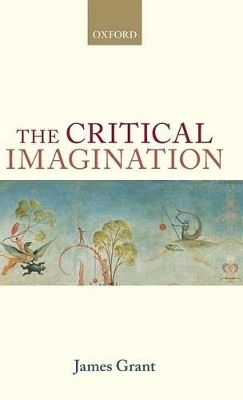
The Critical Imagination
Seiten
2013
Oxford University Press (Verlag)
978-0-19-966179-4 (ISBN)
Oxford University Press (Verlag)
978-0-19-966179-4 (ISBN)
The Critical Imagination explores metaphor, imaginativeness, and criticism of the arts. James Grant critically examines the idea that art is rewarding because it involves responding imaginatively to a work. He explains the role imaginativeness plays in criticism, and goes on to examine why imaginative metaphors are so common in art criticism.
The Critical Imagination is a study of metaphor, imaginativeness, and criticism of the arts. Since the eighteenth century, many philosophers have argued that appreciating art is rewarding because it involves responding imaginatively to a work. Literary works can be interpreted in many ways; architecture can be seen as stately, meditative, or forbidding; and sensitive descriptions of art are often colourful metaphors: music can 'shimmer', prose can be 'perfumed', and a painter's colouring can be 'effervescent'. Engaging with art, like creating it, seems to offer great scope for imagination. Hume, Kant, Oscar Wilde, Roger Scruton, and others have defended variations on this attractive idea. In this book, James Grant critically examines it.
The first half explains the role imaginativeness plays in criticism. To do this, Grant answers three questions that are of interest in their own right. First, what are the aims of criticism? Is the point of criticizing a work to evaluate it, to explain it, to modify our response to it, or something else? Second, what is it to appreciate art? Third, what is imaginativeness? He gives new answers to all three questions, and uses them to explain the role of imaginativeness in criticism.
The book's second half focuses on metaphor. Why are some metaphors so effective? How do we understand metaphors? Are some thoughts expressible only in metaphor? Grant's answers to these questions go against much current thinking in the philosophy of language. He uses these answers to explain why imaginative metaphors are so common in art criticism. The result is a rigorous and original theory of metaphor, criticism, imaginativeness, and their interrelations.
The Critical Imagination is a study of metaphor, imaginativeness, and criticism of the arts. Since the eighteenth century, many philosophers have argued that appreciating art is rewarding because it involves responding imaginatively to a work. Literary works can be interpreted in many ways; architecture can be seen as stately, meditative, or forbidding; and sensitive descriptions of art are often colourful metaphors: music can 'shimmer', prose can be 'perfumed', and a painter's colouring can be 'effervescent'. Engaging with art, like creating it, seems to offer great scope for imagination. Hume, Kant, Oscar Wilde, Roger Scruton, and others have defended variations on this attractive idea. In this book, James Grant critically examines it.
The first half explains the role imaginativeness plays in criticism. To do this, Grant answers three questions that are of interest in their own right. First, what are the aims of criticism? Is the point of criticizing a work to evaluate it, to explain it, to modify our response to it, or something else? Second, what is it to appreciate art? Third, what is imaginativeness? He gives new answers to all three questions, and uses them to explain the role of imaginativeness in criticism.
The book's second half focuses on metaphor. Why are some metaphors so effective? How do we understand metaphors? Are some thoughts expressible only in metaphor? Grant's answers to these questions go against much current thinking in the philosophy of language. He uses these answers to explain why imaginative metaphors are so common in art criticism. The result is a rigorous and original theory of metaphor, criticism, imaginativeness, and their interrelations.
James Grant is a Tutorial Fellow of Exeter College, Oxford.
Introduction ; 1. The Aims of Criticism ; 2. Criticism and Appreciation ; 3. Criticism and Imagination ; 4. Metaphor and Likeness ; 5. The Dispensability of Metaphor ; 6. Metaphor and Criticism ; Conclusion ; Bibliography
| Erscheint lt. Verlag | 11.4.2013 |
|---|---|
| Reihe/Serie | Oxford Philosophical Monographs |
| Verlagsort | Oxford |
| Sprache | englisch |
| Maße | 157 x 227 mm |
| Gewicht | 418 g |
| Themenwelt | Kunst / Musik / Theater ► Allgemeines / Lexika |
| Geisteswissenschaften ► Philosophie ► Sprachphilosophie | |
| ISBN-10 | 0-19-966179-0 / 0199661790 |
| ISBN-13 | 978-0-19-966179-4 / 9780199661794 |
| Zustand | Neuware |
| Haben Sie eine Frage zum Produkt? |
Mehr entdecken
aus dem Bereich
aus dem Bereich
Aspekte einer Ontologie des Logos
Buch | Hardcover (2024)
Springer Fachmedien (Verlag)
CHF 167,95
Wie die Menschheit zu ihrer größten Erfindung kam
Buch | Softcover (2022)
C.H.Beck (Verlag)
CHF 25,20
Macht und Legitimität politischer Sprache im Prozess der europäischen …
Buch | Softcover (2023)
Nomos (Verlag)
CHF 103,60


